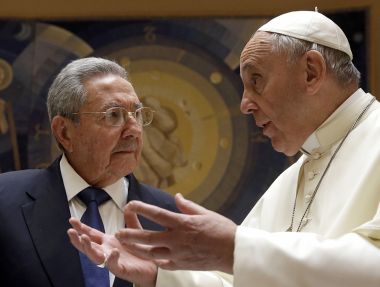Pope Francis set to prove he holds Christian, not communist, views on environment

Pope Francis' upcoming encyclical on the environment will confirm his orientation as a Christian leader and definitely not as a communist as some nervous conservatives view him because of his stand against inequality and his statements about the failures of trickle-down economics, an analytical report said.
The encyclical, set to be released on June 18, has already ruffled some feathers of those fretting about the political orientation of the Roman Catholic Church's highest leader, with Rush Limbaugh and Fox host Sean Hannity charging him of espousing Marxism and socialism, according to a New Republic article.
The BBC even released an article on Sunday, saying: "[Pope Francis] will be a polarising presence, and the question 'Is the pope a communist?' will really matter."
The "National Review Online" and Catholic journal "First Things" also made a fuss over the pope's socialist or Marxist tendencies.
Turning the table on the pontiff's critics, New Republic asked them to ponder if rejection of advocacies for the environment and for equality is being Christian.
"Rather than asking if Pope Francis' positions on reducing inequality and protecting the environment are products of communism, it would be much wiser and more insightful to ask if conservative rejection of environmentalism and egalitarianism are really products of Christianity," the New Republic said.
"This would at least provide context for the tidal wave of rueful tears that will undoubtedly follow the publication of Francis' encyclical on the environment, which will rankle the pontiff's critics not because Francis' thought is communist, but because it is Christian," it added.
The online publication pointed out that each ideology does not belong entirely to a single religion.
"Capitalism has no special affinity with Christianity, just as socialism is not reserved strictly for atheists. Indeed, Christian socialist parties are common elsewhere in the world, and have enjoyed a powerful presence in the United States in past periods," it noted.
Those who criticise the pontiff do not see communism as having the allowance for political participation because they are only used to US politics, New Republic further explained.
"But the pundits accusing Francis of communism do not really seem to view communism as a political orientation, wherein one advocates for reform through participation in routine political activities, like campaigning, fundraising, electioneering, and so on. This is because in the United States, there are only two partisan avenues to political impact: Republican and Democrat," it said.
"The presence of any partisan communists in America is so vanishingly small that communism is instead interpreted as an ideological pose, specifically opposite of the pro-capitalist priors common to both Republicans and Democrats. In other words, you don't have to actually partake in any communist politics to qualify as a communist in the United States, you just have to show insufficient satisfaction with capitalism," the New Republic said.
Vatican reporter John L. Allen wrote last week in "Crux" that the pope, if questioned about his political orientation, would probably say "he comes out of the moderate wing of Argentina's Peronist movement."
Biographies on the pontiff, including "The Great Reformer" authored by Austen Ivereigh, found no evidence that he held membership in any communist party.











